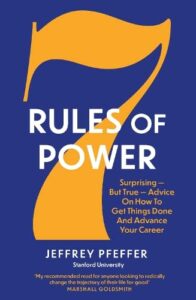
7 Rules of Power: Surprising—But True—Advice on How to Get Things Done and Advance Your Career
Jeffrey Pfeffer
DNF
“Most fundamentally, power is a tool. Like many or maybe most tools, power, once mastered, can be used to accomplish great things, horrendously terrible things, and everything in between. The point: Don’t confuse or conflate your reactions to ‘power’ with your reactions to how, or for what, it has been deployed — particularly if it has been deployed successfully against you. Don’t resent the inevitable ubiquity of power in social life; instead, master it.”
Pfeffer’s fourth book on power in the workplace, what it takes to get it, and its ultimate value.
One of the reviews for this book states, “This is not a nice book, but then, power is not a nice thing.” The premise of 7 Rules of Power is that it can be nice — for individuals who are willing to (in my view) do some shady things. The root of the advice is solid: Build a brand, develop a network, stop doubting yourself, leverage your influence. But the approaches Pfeffer recommends left me feeling like I was learning from a slimy sales guy. It’s not that I don’t believe him—the evidence he presents is compelling, and my personal experience aligns with it—it’s that I’m not interested in playing this game. If using these tactics gains me power that I then become the kind of asshole Pfeffer insists leaders are in Leadership BS, what’s the point? I’ve gained power/money/fear in trade for my morals, manners, and values. I’d rather be less powerful and keep my soul intact.
This book is for you if you’re looking to get ahead in less-than-kind ways.
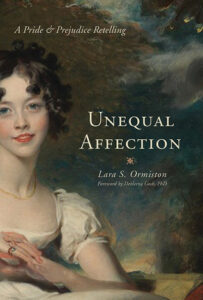
![]()
Unequal Affection: A Pride & Prejudice Retelling
Lara S. Ormiston
“Somehow in the last weeks, so fleeting yet so long, duty had taken on another face. Elizabeth. What he owed to her now was above what he owed to any other—above even his obligation to Georgiana. Somehow, duty and inclination had aligned themselves.”
If questioned the previous day, Elizabeth Bennet would have said that Mr. Darcy was the last man in the world she could be prevailed on to marry. His proposal, however unexpected, has forced her to reconsider. How can she turn down a man who has the fortune to save her and her family? She does not love him, but perhaps in time she may be able to esteem him. After all, isn’t that the most she can hope for?
This book was perfect for mid-winter. I listened to the audiobook, which was excellently narrated and a lovely companion to my assembling a Jane Austen-themed jigsaw puzzle. It’s not as funny as the original novel, but the characters and writing are marvelous and I enjoyed getting more into Darcy’s head. In the end, though, I just couldn’t get behind the premise. Lizzy Bennet would never have accepted Darcy’s first proposal, regardless of how much she cared for her family. A nice alternate “history” trip, but I’ll take Austen’s version any day.
Give this a try if you like introspective, character-focused novels in the style of Jane Austen.
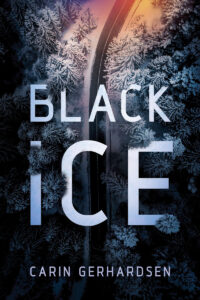
![]()
Black Ice
Carin Gerhardsen (translated by Ian Giles)
“She was so shaken up that her body wouldn’t obey her, fits of shivering taking hold of her, her teeth chattering. She still had enough presence of mind to get out her mobile. To immortalise what seemed most unreal about the picture.”
In the winter of 2014, a deadly crash goes unreported. Four years later, a group of strangers with nothing but the accident in common are forced to reckon with their actions — and one of them is willing to kill to keep their secret.
This book was unexpected. The mystery aspect is present, but is mostly an all-too-convenient setup for the author to spend time laying out her characters’ inner thoughts and motivations. I didn’t like or trust most of the characters, which I suppose is the point. Everyone has secrets and reasons for doing what they do. I like to think I’d make a better choice in a similar situation, but Gerhardsen seems to be saying that her characters thought that about themselves too. A good read, but I think it could have been a bit shorter and the ending a bit better.
Add this to your TBR if you like your mysteries to be character-driven (and don’t mind unreliable narrators).
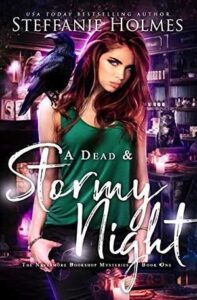
![]()
A Dead and Stormy Night
Steffanie Holmes
“I blamed Emily Brontë. The brutish and untamable Heathcliff ruined me for nice guys.”
After losing her dream job, Mina Wilde is happy to score a gig at the local secondhand bookshop she loved as a kid. Unfortunately it’s been taken over by a grouchy luddite, his sexy roommate, and a raven that really hates a certain poem. The bookshop has secrets that Mina is determined to discover, but nothing puts a plan on hold like a dead body. Now it’s up to Mina and the co-workers she’s growing fonder of by the day to unmask the killer before it’s too late.
This was my first read in the “reverse harem” genre, and boy was it a doozy! In all honesty, the spicy stuff was the least interesting part — I’m way more curious about (not a spoiler, it’s in the publisher’s blurb!) a bookshop that pulls fictional people into the real world. The characters are surprisingly complex, and my enjoyment was not dimmed by seeing the “whodunnit” from a mile away.
Pick this up if you like a spicy reverse harem series that romps through paranormal, fantasy, and mystery.

![]()
The Codebreaker’s Secret
Sara Ackerman
Book club
“If anyone knows death, it’s the sea.”
Isabel Cooper has spent the last two years mourning the death of her brother at Pearl Harbor. Her work as a codebreaker has the potential to save lives, and she can’t let anything get in her way — even her own heart. Decades later, two journalists covering the opening of the newest Rockefeller hotel stumble upon a much bigger story that’s been waiting to be told.
My hopes for a book are rarely lower than when the cover is of a woman in 1940s attire facing away from the reader while a tank or plane trundles past. Fortunately (for me and my book club), reading this book was an absolute pleasure. The story is good — if a little too convenient to be totally believable — and I think Ackerman depicts grief, war, and PTSD well and with empathy. The ending was picture-perfect, and I’ll admit to shedding a few tears over the pages.
Read this if you enjoy World War II historical fiction and dual-timeline stories.
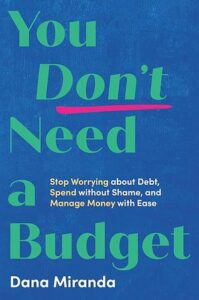
![]()
You Don’t Need a Budget: Stop Worrying about Debt, Spend Without Shame, and Manage Money with Ease
Dana Miranda
“Just like dieting as a method of weight loss, the utility of budgeting for financial security comes down to that persistent truth: we don’t do it…the level of restriction and deprivation and the lack of nuance in budgets—as in diets—makes them unsustainable.”
Certified Educator in Personal Finance Dana Miranda believes that budget culture has ruined our relationship with money. Our systems and cultural expectations about money pile on the stress and shame, forcing us to treat money as the goal instead of as a tool. You Don’t Need a Budget attempts to help readers re-frame the purpose of money management.
I’m always on the hunt for interesting personal finance reading; when I heard an interview with Miranda on the Money with Katie podcast a few months back, I was intrigued enough to pick up a copy. Reading this was similar to eating handfuls of Sour Patch Kids: I had to muscle through the initial shock to get to the more palatable center. Miranda’s word choices felt deliberately outrageous, with chapter titles like “You Don’t Have to Pay All of Your Bills” and “You Don’t Need An Emergency Fund” — but once I got past the language it was easier to see that Miranda is focused on reframing how readers relate to money, rather than just advocating blowing it all up. I appreciated her unflinching approach to knowing all your options. Not having tens of thousands of dollars in emergency savings, deciding to declare bankruptcy, or not to pay down your debt as fast as possible, could be the right decision — but you need to know the context and consequences. Although I won’t be following Miranda’s specific advice, reading You Don’t Need a Budget is helping me relax and remember that money is a tool, not (necessarily, always) the goal.
Give this a try if you’re looking for a non-traditional approach to money management.
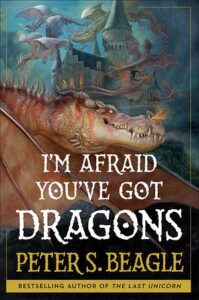
![]()
I’m Afraid You’ve Got Dragons
Peter S. Beagle
“The warning came in the form of a great wind, sudden and cold, sweeping out of the western mountains on a perfectly bland and cloudless summer day.”
The kingdom of Bellemontagne has a dragon problem, and Princess Cerise needs it solved now. A Crown Prince has arrived to propose, and that can’t happen with those nasty things scuttling around. Robert Thrax has been exterminating dragons since childhood, and it looks like it will be the standard castle clean-out. He has no idea how wrong this job is about to go.
Beagle is known for his twisted takes on fairy tales, so I went into this one with high hopes. Unfortunately the experience was a letdown. The big issue was a case of genre muddle: it’s like Beagle couldn’t decide whether to write a cozy fantasy, a slapstick comedy, or a violent thriller, so he tried unsuccessfully to do it all. The story felt both overly long and incomplete, with too many characters and concepts that were left undeveloped. I pushed through hoping for a payoff, but the ending was as disjointed as the rest of the novel.
Can’t say I’d recommend this one. If you want a good read by Beagle, check out The Last Unicorn instead.
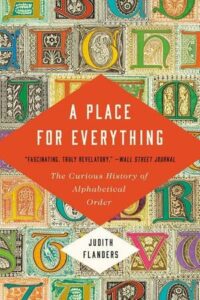
![]()
A Place for Everything: The Curious History of Alphabetical Order
Judith Flanders
Book Riot 2025 Read Harder Challenge: Read a book about little-known history
“ ‘The aspects of things that are most important for us are hidden because of their simplicity and familiarity…We fail to be struck by what, once seen, is most striking and most powerful.’ “
How many times do you think you’ve used a dictionary, looked up a recipe in a cookbook, searched for your favorite author’s latest work in a bookstore, or changed the sort order of the files in your Google Drive? The alphabet is such an integrated part of our lives that it’s essentially invisible, but the story of how it became ubiquitous spans centuries. A Place for Everything chronicles that journey.
I cannot stop thinking about this book. It’s amazing how sometimes the most unremarkable-seeming things can be so complex. It’s so odd to realize that alphabetical order wasn’t something we needed until a certain point because there just wasn’t enough written material — only monasteries had any books at all, and only a few dozen at that. It was also wild to learn that some pushed back against this new system because they believed it was sacriligious (God is above all and should be listed before Angels, then Humans, then Animals!) or offensive to their superiors (university students should be organized by the social status of their parents!). The topic was interesting and I appreciate Flanders’ research, but I found the reading experience itself slow and boring. I think I would have liked it more if I’d done it as a buddy read, or if I was a bit more academic.
A dense, somewhat dry, factoid-filled look at an invisible piece of history.






